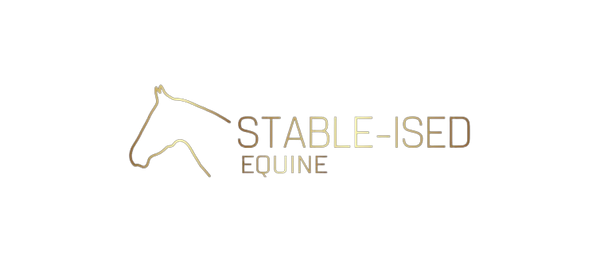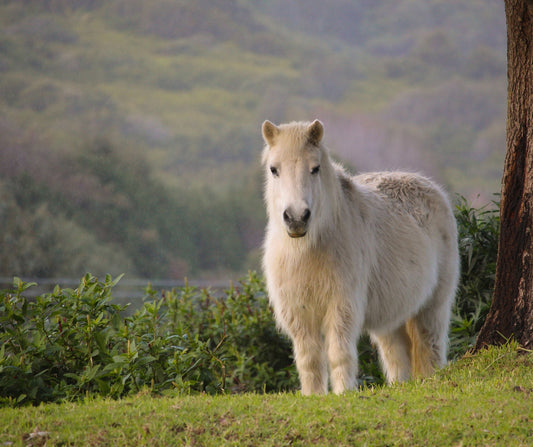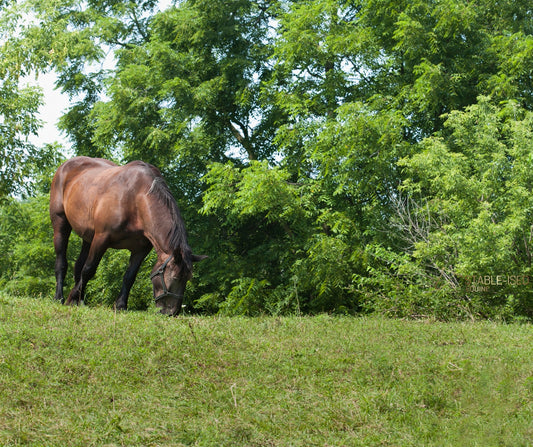Cushing's, also known as Pituitary Pars Intermedia Dysfunction (PPID), is a common endocrine disorder affecting horses, especially as they age. Managing a horse with Cushing's requires special attention, particularly with regards to their dietary intake.
Understanding Cushing's:
Cushing's in horses primarily affects the pituitary gland, leading to the overproduction of certain hormones. This can result in various health issues, including abnormal hair growth, muscle wasting, and susceptibility to infections. Managing Cushing's involves a combination of medication, exercise, and dietary modifications.
Balanced Diet:
- High-Quality Forage:
For horses with Cushing's, the foundation of their diet should be high-quality forage, such as good pasture (where obesity or laminitis isn’t a risk) or grass hay. High-fibre forage is essential for maintaining gut health and keeping the gastrointestinal tract operating as it should.
- Low Sugar and Starch:
Horses with Cushing's are often more sensitive to sugars and starches in their diet. It is imperative to avoid feeding them grains and concentrate feeds that are high in these elements and instead opt for feeds with lower sugar and starch concentrations, such as beet pulp, legumes, legume hulls, and grass hay.
- Minimize Grazing:
If your horse has access to lush and actively growing or short and stressed pasture, limiting their pasture grazing time to prevent them from consuming too much sugar-rich grass is advisable. Grazing muzzles, strip-grazing, and track systems can be helpful in controlling their intake.
- Supplements:
Horses with Cushing's may have compromised immune systems and may not absorb nutrients efficiently so careful consideration needs to be given to how well their diet is balanced. Certain vitamins and minerals, such as vitamin E, selenium, and zinc, are essential for overall health and immune function, as are omega-3 fatty acids, found in linseed/flaxseed or fish oil supplements, which have anti-inflammatory properties. Prebiotics and probiotics can help support gut health and digestive function and are therefore often beneficial for horses with Cushing’s where they need a “helping hand” when it comes to digesting and utilising what they consume.
Medication and Monitoring:
In addition to dietary adjustments, most horses with Cushing's require medication to help regulate their hormone levels. Veterinarians often prescribe Pergolide or other medications. It's crucial to administer these medications as prescribed and to regularly monitor your horse's health and hormone levels.
Weight Management:
Maintaining a healthy weight is crucial for horses with Cushing's. Obesity can exacerbate the condition and increase the risk of laminitis. It’s important to familiarise yourself with body condition scoring and learn to identify what physical changes could suggest your horse’s management and/or diet needs adjusting.
Regular Exercise:
Exercise is crucial for managing Cushing's in horses. It helps maintain muscle mass, improve circulation, and manage weight. Exercise, or a lack thereof, is one of the most overlooked factors when it comes to managing metabolic and laminitic equines.
Caring for a horse with Cushing's requires a holistic approach that includes dietary adjustments, medication, weight management, and regular exercise. Always consult with your veterinarian and equine nutritionist for a customised care plan tailored to your horse's specific needs. With the right management, horses with Cushing's can lead very happy and comfortable lives.




